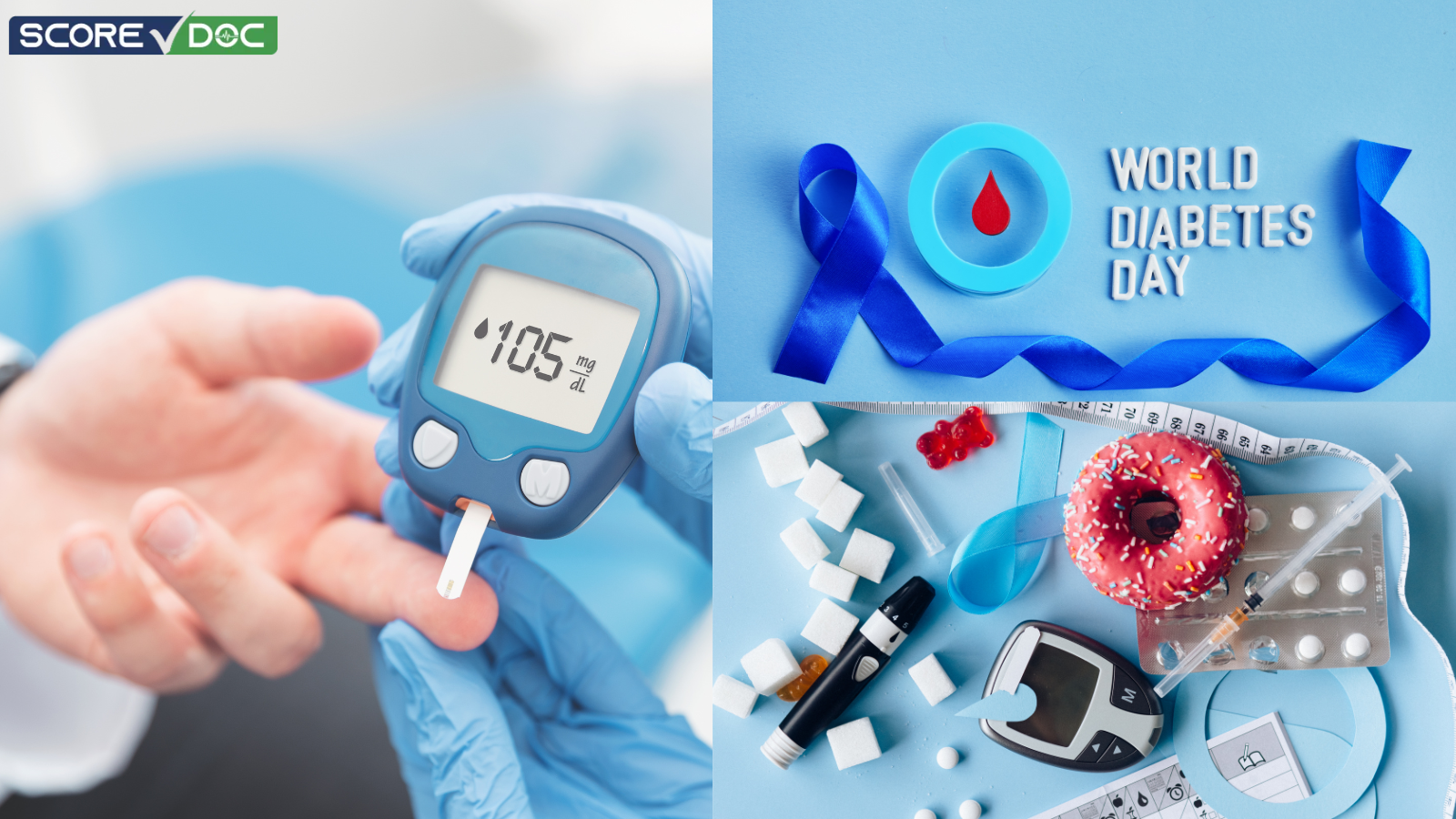How To Choose the Best Doctor for Diabetes Management on This World Diabetes Day

Diabetes isn’t just another health condition, it’s a lifelong commitment to monitoring, managing, and adapting. Whether you were recently diagnosed or have been living with diabetes for years, the right doctor can make a world of difference in how effectively you manage your health.
Proper diabetes management goes far beyond keeping your blood sugar in range. It’s about preventing long-term complications, maintaining energy and mental clarity, and improving overall quality of life. The doctor you choose becomes your long-term partner in this process, helping you navigate medications, lifestyle changes, and the ups and downs that naturally come with chronic care.
Why Specialized Care For Diabetes is Important
Diabetes affects more than just blood sugar; it influences your heart, kidneys, nerves, eyes, and even mental health. That’s why proper diabetes management requires more than routine prescriptions; it needs a coordinated, specialized approach.
Specialized care ensures that every aspect of your condition is monitored, from medication and insulin adjustments to lifestyle and nutritional support. Patients who work with a diabetes-focused care team, especially those involving endocrinologists and diabetes educators, often achieve more stable glucose levels, experience fewer complications, and feel more confident managing their health day to day.
In short, specialized care doesn’t just treat symptoms - it helps you maintain long-term control and quality of life.
Finding the Right Type of Doctor for Your Needs
When it comes to managing diabetes, not all doctors play the same role. Understanding who does what can help you choose the right partner in your care journey.
- Primary Care Physicians (PCPs): Often the first point of contact after diagnosis, they handle general diabetes management, monitor your progress, and coordinate care with other specialists.
- Endocrinologists: Experts in hormone-related disorders, they’re best suited for complex or hard-to-control diabetes cases. If your blood sugar remains unstable despite treatment, or if you need advanced therapies like insulin pumps, an endocrinologist can provide specialized guidance.
- Diabetes Educators and Nutritionists: They support your day-to-day management - helping you understand how food, exercise, and habits affect your glucose levels.
Choosing the right diabetes doctor depends on your current health needs and comfort level. For example, someone newly diagnosed might start with their PCP, while someone struggling with fluctuating glucose levels or medication side effects may benefit from seeing an endocrinologist.
What to Consider When Choosing a Specialist
Selecting a diabetes doctor isn’t just about finding the highest rating, it’s about understanding why patients rate them that way.
Here’s what to look for when comparing reviews or profiles online:
- Overall patient sentiment: Look for recurring themes such as “takes time to explain” or “attentive listener.” These insights can tell you more than a number ever could.
- Recent reviews: Healthcare practices evolve. Focus on what patients have said in the last 6–12 months for the most accurate reflection.
- Balanced feedback: A mix of positive and negative reviews often reflects authenticity.
- Response rate: A doctor who takes time to respond to reviews (especially negative ones) shows professionalism and patient engagement.
Questions to Ask During Your Appointment
Your first few appointments with a diabetes doctor set the foundation for your ongoing care. Knowing what to ask can help you understand your doctor’s approach, set expectations, and make sure your care plan fits your lifestyle.
Here are a few meaningful questions to guide your conversation, along with the kind of responses you should expect from a knowledgeable and patient-centered doctor:
1. How will we track my blood sugar progress over time?
A good doctor will explain how often you should check your glucose levels, when to get A1C tests, and what your target range should be. They might also suggest using tools like a continuous glucose monitor (CGM) or glucose log apps for easier tracking.
2. What treatment options are available for me, and how do we decide which one to start with?
You should expect your doctor to discuss both medication and non-medication options, explaining why a particular approach suits your type of diabetes and lifestyle. A collaborative doctor will involve you in every treatment decision, not just prescribe and move on.
3. What should I do if my blood sugar readings are consistently high or low?
An experienced diabetes doctor will guide you through step-by-step actions; how to adjust your meals, activity, or medications and when to call the clinic for advice.
4. How can you help me manage my diet and exercise better?
Rather than giving generic advice, your doctor should connect you with a registered dietitian or diabetes educator, or provide specific meal and activity recommendations suited to your age, weight, and schedule.
5. How often will we review my treatment plan?
A proactive doctor will schedule regular check-ins (typically every 3–6 months) to monitor your progress, update medications, and discuss any challenges you’re facing.
6. What signs should I watch for that might mean my diabetes is getting worse or complications are starting?
Your doctor should clearly explain symptoms to monitor; such as numbness, vision changes, fatigue, or unexplained weight loss, and when to seek help.
A reliable diabetes doctor takes time to answer these questions with clarity and empathy. They’ll explain your results in plain language, encourage you to take an active role in your care, and make sure you leave each appointment with a clear next step, not more confusion.
Red Flags: When to Consider a Different Doctor
Even if a doctor has great credentials, the relationship has to feel right for you. If you regularly encounter any of the following situations, it may be time to look for a second opinion or switch providers:
1. Your appointments feel rushed, and your questions go unanswered -
If your doctor seems impatient, avoids eye contact, or ends the visit before addressing your concerns about symptoms, glucose readings, or medications, that’s a sign your care may not be getting the attention it deserves.
2. You’re not getting clear follow-up or guidance between visits -
If you’ve reached out about unusual blood sugar fluctuations, prescription refills, or side effects and haven’t received timely responses, it can disrupt your diabetes management. Consistent follow-up and accessibility are critical for chronic conditions.
3. The doctor isn’t adjusting your treatment plan even when your numbers don’t improve -
If your A1C remains high or your glucose levels fluctuate and your doctor continues the same approach without reevaluating medications, diet, or testing schedules, it may be a sign they’re not staying proactive with your care.
A strong doctor-patient relationship is built on trust, time, and communication. You should feel heard, supported, and confident that your care plan is evolving with your needs, not stuck on autopilot.
FAQs: Common Questions About Diabetes Management
Q1: How often should I see my diabetes doctor?
Ans: Most patients should visit their diabetes doctor every 3–6 months, depending on how stable their blood sugar levels are. If your treatment plan changes frequently or you’re starting insulin, visits may be more frequent.
Q2: What is the difference between a diabetes doctor and an endocrinologist?
Ans: While many primary care doctors manage diabetes, an endocrinologist is a specialist trained in hormonal disorders, including diabetes. They’re especially helpful for patients with Type 1 diabetes or complex Type 2 cases.
Q3: Can lifestyle changes replace medications?
Ans: In some cases, especially early-stage Type 2 diabetes; diet and exercise may reduce or delay the need for medication. However, decisions about medication should always be made in consultation with your doctor.
Q4: How do I know if my doctor is providing effective care?
Ans: You should see improvements in blood sugar levels, feel heard during visits, and receive clear guidance on next steps. Regular lab monitoring and updated treatment plans are good signs of proactive care.
Q5: How can I choose a doctor for diabetes management?
Ans: Start by researching specialists in your area, reviewing credentials, and checking patient feedback across multiple platforms. You can use ScoreDoc, it helps you do this efficiently by consolidating ratings and reviews from across the web into one profile.
Making Informed Decisions for Better Diabetes Management
Choosing the right doctor for diabetes management isn’t just a box to tick, it’s a foundational step toward long-term health and confidence. The right specialist can guide you through medication choices, diet adjustments, and new treatment technologies, ensuring you stay ahead of potential complications.
Your health is a long-term journey—Start it with the right doctor by your side!


